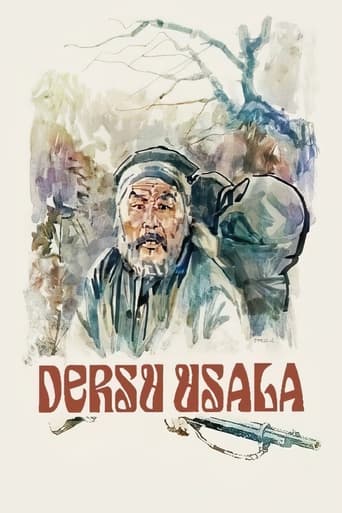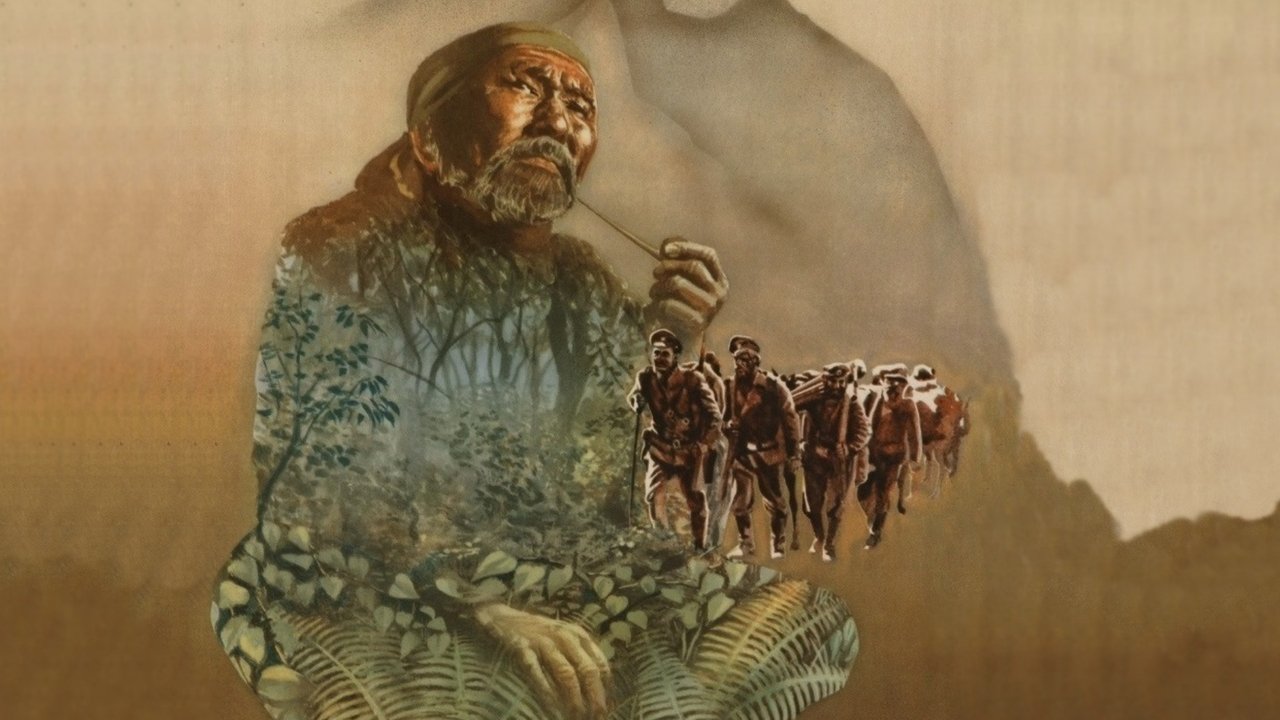omkar1984
I term it as a 'masterpiece' ! Being a Nature adorant, the blissful AND intimidating aspects of the Nature were a treat for me. Sadly, there aren't many(any?) movies that focus on the mankind's ambitious projects like surveying but this movie has an adequate depiction of the perils faced by the surveyors. Dersu's skills alarmed the timid person inside me who has been afraid for years regarding the lack of survival skills if sent out away from the civilization ! The movie impeccably underlines the timeless truth - the one staying close and integrated with Nature, knows how the Life on the planet should be respected !!! The plot is strong, the actors have done their parts flawlessly and the cinematography is majestic. Dersu's instincts, the naive but warm-hearted and cheerful soldiers, the sober and emotional captain Arsenyev, the Chinese hermit all touch the Heart. At the beginning of the first expedition, the soldiers sing a song, then Dersu arrives and at the end of the expedition, they sing the same song and that is when the viewer realizes that it, in a way, depicts the hunter Dersu. When the captain is merry on meeting Dersu during the second expedition, the fellow soldiers sing a song about a grey(aging!) eagle which is a pleasant humor. Maxim Munzuk has portrayed all the simple, yet, deep emotions of a benevolent man living in the wilderness - the pangs of his family loss, the respect for Nature and other living beings, the shock and grief of loss of strength due to aging, a man from the wild feeling smothered in the civilization and the brave decision to go back to the wild even if it means death.Yes, one cannot ignore the perpetual dark mood of the film, I speculate it as a result of Kurosawa's melancholic and unstable mental state just before he begun directing the film. To summarize, the movie will go as a pearl in (my brain's memory)box ...
davehouses
While at first for me it was a bit strange watching a Kurosawa film that didn't have Japanese actors or language (it's not a racist comment, I don't think; seeing his staging and framing without Japanese people, if you've seen a lot of his films can be a bit off- putting at first) the movie grows on you and you start to accept everything that's being chucked at you.The characters of Arseniev and Dersu are just pleasant to watch. You feel they really care for each other, as Arseniev is very accepting and understanding of the way of live that he has never confronted before in meeting Dersu. They just get along so well and love and respect each other so much and in every way, it's hard not to like watching them interact and go through situations together.You never see Dersu without Arseniev close to him in his life (either in context of their lives or physically), as the story is told from Arseniev's perspective, the years which Dersu wanders as Arseniev briefly returns to society in the middle of the film remains untold; but you do see Arseniev in the absence of Dersu (even if only for brief lapses) but you do feel the absence and wait in anxiety for Dersu to make his way back into the story.There's one bit at the beginning of the 2nd segment of the film, where Arseniev is told by one of his men that he came across a hunter, but when the hunter asked the name of the leader of his unit he was not allowed by regulations to tell him who his commander is, Arseniev then rushes into the forest and in frame there is a far off speck of a man climbing through the brush and as you hear Arseniev shout "Dersu!" hearing Dersu reply, "Captain!" as they rush to hug each other is just such a heartfelt moment. Towards the end of the film, Dersu's eyesight fails and accepts that he cannot keeping living off the woods like he has his whole life and Arseniev offers him a place in his own home, back in the city, which Dersu accepts. After a time, it becomes apparent to both of them that Dersu's soul is being broken as he tries to adapt to society and he cannot live as freely as he's used to, so he breaks the news to Arseniev that he must go back to the forest. Arseniev without saying a word, walks offscreen and goes upstairs and brings back his new rifle of the latest model and gives it to Dersu without a second thought. And the fact that Arseniev is so accepting of Dersu's choice and doesn't take offense to his leaving but accepts his decision and supports him is the heart of the movie.The movie seems to be about the end of an era and in the ever- progressing society that we live in, Arseniev discovers this life- force that walks to the beat of it's own drum even as everything progresses and becomes more civilized. Well that's how I explain the beginning of the movie and everything that follows.The cinematography and the editing are gorgeous, by the way. And, of course, the direction. The lighting CAN be a bit BIT outdated, like when they film night scenes by the campfire, but it's such a good movie anyway.
Ilpo Hirvonen
Akira Kurosawa's "Dersu Uzala" (1975) is an oddity in the director's oeuvre, but nonetheless, or precisely because of it, beloved by many. It has a historical setting, though it has no samurais and very little action. It focuses on the lyric moments of humanity which have always been integral to the beauty of Kurosawa's cinema. The film is based on Vladimir Arsenev's novel about his expeditions to Ussuria in the early 20th century during which he became acquainted with an aging hunter living in the woods, gathering all he needs from the environment. The simple charm of the story probably fascinated Kurosawa and offered a perfect basis for that time in his career. Before making "Derzu Uzala", Kurosawa had suffered both a professional and a personal tragedy as his first film in color "Dodes'ka-den" (1970) became a huge financial flop, and subsequently Kurosawa tried to commit suicide. Thus, in the early 1970's Kurosawa had truly lost his faith in cinema, the modern world, and life itself (for a moment at least). For this level of desolation, Arsenev's story offered a perfect means of meditation since its setting was far from capitalism and modern life as well as contemporary cinema. After all, "Derzu Uzala" is, at its heart, a story about total unselfishness, utter humility, and the beauty of life in touch with nature. What is more, Kurosawa uses a veritably lingering narrative which is combined with ascetic aesthetics. Overall, the style is very stripped. The gorgeous shots of the Russian landscape may be sublime, but it is really the landscape that is sublime. The form that shows it is naturalistic. "Dersu Uzala" is far from the surrealistic poetry combined with Gorky's realism that characterized Kurosawa's previous film, "Dodes'ka-den". It is much simpler. It gave Kurosawa a moment to contemplate the values and ideals of life that were dearest to him.In all its simplicity, "Dersu Uzala" tells us about the friendship between two different men: a Russian soldier, Arsenev, and a self-reliant hunter, Dersu. It studies the conflict of nature and civilization which forces a life of nature to diminish. The heart-rending tale is heavy with nostalgic yearning for the past and a melancholic sense of emptiness for the future. All this might sound sentimental, but somehow Kurosawa manages to create a character out of Dersu that is not idealized in a sentimental fashion. Yet, it is very difficult to point out the elements in the film which cause this effect; that is, the believable disposition of Dersu's character. On paper, it sounds naive and sentimental, but on screen -- in Kurosawa's images -- it gathers a new dimension. Arguably "Dersu Uzala" is the simplest story Kurosawa ever told, but maybe even more importantly it is also the story which he told in the simplest fashion.
lasttimeisaw
This is one world-class piece of work desperately in the waiting line for a BluRay revamp, watched this Kurosawa's Soviet Union film in DVD format, the quality is discouraging, but the film speaks for itself in shedding bells and whistles and homing in on a camaraderie between a Soviet military explorer and a seasoned local hunter among the bleak Ussuri inhospitable region. Storyline-aside, it is another Kurosawa's awesome visual spectacle, a tremendous field shooting endeavor, epitomizes by the sun-moon co-existence with solemn placidness, furthermore, it is a hymn to mother nature, Dersu personifies as the harmonious co-habitant of the mighty wilderness, a sublime soul with well-versed survival skills, on the contrary to my recent watched documentary TOUCHING THE VOID (2003, 8/10), DERSU UZALA owns a purer and more admirable prospect, instead of conquering the insurmountable to chase a spur of glory and invincibility, it is far more intrepid and unpretentious to be a part of it with reverence and be respectful to its law and act, in addition to its indefatigable undertone against industrialized modernism (it is the brand-new rifle, a token of friendship, actually wreaks the somber demise of Dersu). Strictly speaking, there is merely two characters in the film, Dersu (Munzuk) and the Russian Captain (Solomin), a bond is tenably formed through their expedition in the wild, from lush jungle to walking-on-the-thin-ice frozen river, the life-saving bravado during a squalling night when they lost their track on a snow land or a torrent peril, Kurosawa molds a great range of topography with taut excitement where it is required. The character study of Dersu also is been executed through the observation and the interaction from Captain (viewers' proxy), who is enthralled by Dersu's simple yet ethereal nature, a rare bird may or may not be extinct now. The dual-acting from Munzuk and Solomin is the fruit of naturalistic emancipation and unassuming engagement. Also a memorable presence is Isaak Shvarts's accompanying score segues from lithe to menacing, eerie to sonorous, with Russian folklore and shanty as well.Being a Chinese, I cannot avoid mentioning the sensitive timing (after China and Japan's rapprochement in 1972 and China and Soviet Union's dispute in 1969) of the film-making, which prompted an accusation from Chinese government concerns a so-called political libel on Chinese people, mainly by vilifying Hunhutsi (which literally means red beard in Mandarin) as the villain and the nature-balance defier. But honestly, this episode is largely overstated since there is no direct confrontation at all in the film, at least for my compatriots, don't let this smokescreen blinds your eyes, DERSU UZALA is a spirited ethnological oeuvre could inspire whoever has a chance to watch it, preferably on a big screen or at least a BluRay edition.


 AD
AD

